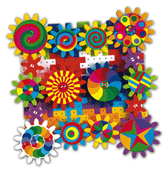
By Ellen Notbohm
South Florida Parenting
Some days it seems the only predictable thing about it is the unpredictability. The only consistent attribute, the inconsistency. There is little argument on any level but that autism is baffling, even to those who spend their lives around it.
The child who lives with autism may look "normal," but his or her behavior can be perplexing and downright difficult. Today, the citadel of autism, once thought an "incurable" disorder, is cracking around the foundation. Every day, individuals with autism show us they can overcome, compensate for, and otherwise manage many of the condition's most challenging aspects. Equipping those around our children with a simple understanding of autism's most basic elements has a tremendous effect on the children's journey towards productive, independent adulthood. Autism is an extremely complex disorder, but we can distill it to three critical components: sensory processing difficulties, speech/language delays and impairments, and whole child/social interaction issues.
Here are 10 things every child with autism wishes you knew.
1. I am a child with autism. I am not "autistic." My autism is one aspect of my total character. It does not define me as a person. Are you a person with thoughts, feelings and many talents, or are you just fat (overweight), myopic (wear glasses) or klutzy (uncoordinated, not good at sports)?

3. Please remember to distinguish between won't (I choose not to) and can't (I'm not able to). Receptive and expressive language are both difficult for me. It isn't that I don't listen to instructions. It's that I can't understand you. When you call to me from across the room, this is what I hear: "*&^%$#@, Billy. #$%^*&^%$&*" Instead, come speak directly to me in plain words: "Please put your book in your desk, Billy. It's time to go to lunch." This tells me what you want me to do and what is going to happen next. Now it's much easier for me to comply.

5. Be patient with my limited vocabulary. It's hard for me to tell you what I need when I don't know the words to describe my feelings. I may be hungry, frustrated, frightened or confused, but right now those words are beyond my ability to express. Be alert for body language, withdrawal, agitation, or other signs that something is wrong.
There's a flip side to this: I may sound like a little professor or a movie star, rattling off words or whole scripts well beyond my developmental age. These are messages I have memorized from the world around me to compensate for my language deficits, because I know I am expected to respond when spoken to. They may come from books, television or the speech of other people. It's called echolalia. I don't necessarily understand the context or the terminology I'm using, I just know it gets me off the hook for coming up with a reply.
6. Because language is so difficult for me, I am very visually oriented. Show me how to do something rather than just telling me. And please be prepared to show me many times. Lots of patient repetition helps me learn.

A visual schedule is extremely helpful as I move through my day. Like your day planner, it relieves me of the stress of having to remember what comes next, makes for smooth transitions between activities, and helps me manage my time and meet your expectations. Here's a great web site for learning more about visual schedules
http://www.cesa7.k12.wi.us/
7. Focus and build on what I can do rather than what I can't do. Like any other human, I can't learn in an environment where I'm constantly made to feel that I'm not good enough or that I need fixing. Trying anything new when I am almost sure to be met with criticism, however constructive, becomes something to be avoided. Look for my strengths and you'll find them. There's more than one right way to do most things.
8. Help me with social interactions. It may look like I don't want to play with the other kids on the playground, but sometimes it's just that I simply don't know how to start a conversation or enter a play situation. If you can encourage other children to invite me to join them at kickball or shooting baskets, I may be delighted to be included.
9. Try to identify what triggers my meltdowns. This is termed "the antecedent." Meltdowns, blowups, tantrums or whatever you want to call them are even more horrid for me than they are for you. They occur because one or more of my senses has gone into overload. If you can figure out why my meltdowns occur, they can be prevented.

It all comes down to three words: Patience. Patience. Patience.
Work to view my autism as a different ability rather than a disability. Look past what you may see as limitations and see the gifts autism has given me. I may not be good at eye contact or conversation, but have you noticed I don't lie, cheat at games, tattle on my classmates, or pass judgment on other people?

I probably won't be the next Michael Jordan, but with my attention to fine detail and capacity for extraordinary focus, I might be the next Einstein. Or Mozart. Or Van Gogh.
They had autism too.







.jpg)


















